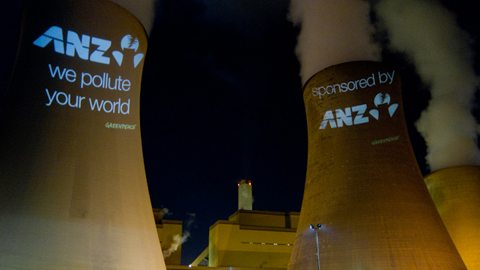On Friday it was revealed that for the first time, a bank had insisted on a confidentiality clause as part of a finance deal for a coal power station — so that its name could not be revealed for fear of reputational damage.

Yesterday, Westpac announced in its annual sustainability report that they “will avoid involvement in transactions which support the establishment or long-term continuation of inefficient and high carbon-emitting assets into the future”.
Does this mean the banks are starting to walk away from coal? If so, it’ll be a big turnaround.
Last month, Greenpeace revealed that over the past five years, Australia’s Big Four banks have financed the Australian coal industry to the tune of about $5 billion — more than six times more than was invested in renewable energy. This is in stark contrast to the green marketing claims and sustainability awards won by many banks.
Until a few weeks ago, ANZ openly claimed on its website that it was the largest financier of coal in Australia. While this boast has now been removed, the Greenpeace research confirms that ANZ has been the largest financer of coal power stations and coalmines over the past five years, despite being recognised as the world’s most sustainable bank for four years running by the Dow Jones Sustainability Index (DJSI).
The banks have been copping a hiding over interest rate rises and excessive fees, and they are now also coming under intense environmental scrutiny over the impact of their lending practices.
The most recent new coal power station built in Australia was Bluewaters II, in Western Australia, which was only commissioned at the end of last year. The finance deal was pulled together in 2007, with ANZ and NAB acting as lead arrangers of a consortium of banks, and Westpac also playing an important role.
There are about 12 proposed new coal power stations on the drawing board around the country, and the next major project under way is the refurbishment of the antiquated Muja A&B power stations in Western Australia. On Friday it was revealed by Verve Energy chief executive Shirley In’t Veld that funding for the $150 million project was conditional on a confidentiality pledge. According to the AFR, she was “really shocked when the issue of reputational risk was raised by the bank”.
Given the policy announced by Westpac, it would be surprising if it was involved in the Verve coal finance deal. Westpac has long positioned itself as a leader on sustainability and was no doubt annoyed when ANZ knocked it off the top spot on the DJSI. It was probably also disappointed when NAB got the gig on the Prime Minister’s business round table for the development of a carbon price.
But the new Westpac “financing sustainable energy” policy puts it ahead of the other banks on the crucial issue of energy finance, although there is still a big question over what its policy actually means in practice.
According to Giles Parkinson writing in today’s Climate Spectator, a spokesperson said that Westpac would honour its current commitments, but no new fossil fuel projects would be supported unless it adopted cleaner and less intensive generation, such as carbon capture and storage technology.
This statement goes a step further than Westpac’s official statement, which stops short of explicitly ruling out financing of new coal power stations.
We’ve all had enough of weasel words in the climate debate. Julia Gillard’s pre-election announcement that “no new dirty coal power stations will be built in Australia” is yet to be put to the test. Westpac’s announcement, along with the increasing reputation risk of coal investments, will be a welcome push in the right direction.
Regardless of how the banks manage their messaging, it is clear the social licence for new coal is being withdrawn.
(Blog first appeared on http://blogs.crikey.com.au)


